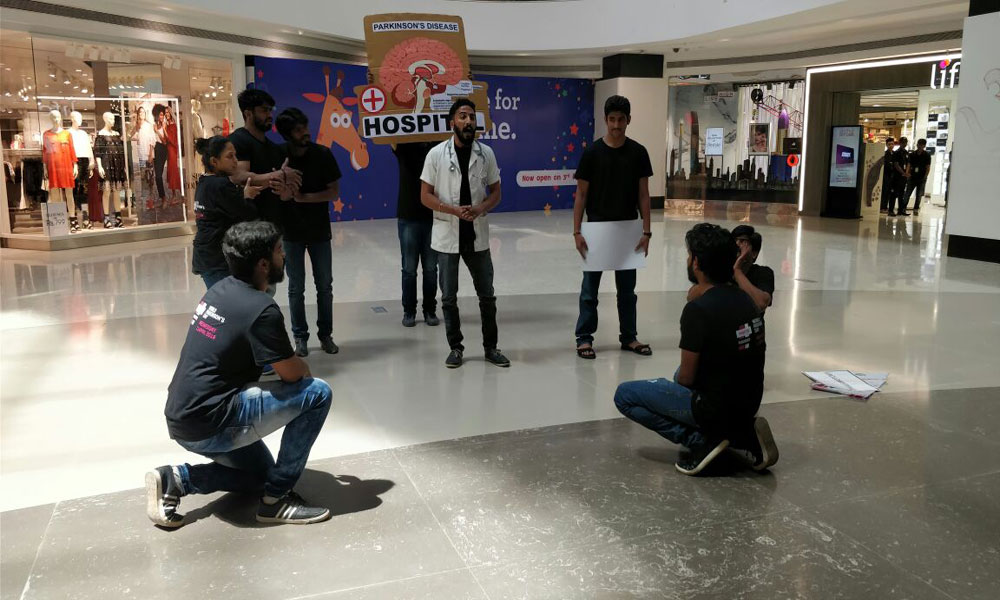Doctors and a theatre group hold awareness drives in the city to educate people on World Parkinson’s Day
Bangalore, April 11, 2018: A theatre group has been conducting street plays across the city today to raise awareness about the Parkinson’s disease today in the city on World Parkinson’s Day. Vinay Shastry, founder of the VASP theatre group, said that he decided to execute these street plays after he found out that a relative was suffering from the disease.
Dr. Thomas Matthew, Neurologist based in Bangalore, said that Parkinson’s is a neurological disorder. “When the dopamine secreting neurons in the brain degenerate and die, you develop this disease. You cannot cure it, but it can be treated with medication. The treatment is symptomatic, that means, the treatment involves controlling the symptoms of the disease but not the cause,” he said.
Radha Ramaswamy, director of Basal Ganglia support group, founded the group in 1996 after her husband was diagnosed with Parkinsons. “We started with a small group and gradually the members have increased. I decided to start this group after my husband was diagnosed to provide encouragement to the patients and so that they can come, meet and interact with each other,” she said. Now, they have about 200 patients as members and we try to meet monthly and a group of physiotherapists and yoga instructors are also a part of this group.
Dr. Prasanth LK, a leading Neurologist & Parkinson’s Disease Specialist from Apollo Hospitals, has also been associated with the theatre group in their bid to create awareness, across the city today. He said that hallucinations can be a side effect of Parkinson’s medication. Another side effect of Parkinson’s medicine Levodopa is levodopa‐induced dyskinesias (LID) which is characterized by abnormal movements exhibited by patients after prolonged use of the medicine.
However, Dr. Prasanth added that the hallucinations are not very common and it is mostly the elderly who develop these side effects. Higher the dosage of the medicines more is the probability of developing these complications. Hence, when a patient starts hallucinating, we try to control the dosage of the medicines.
“Parkinson’s disease is most visible in the 50 to 60 age group. However, I have had young patients and the youngest patient that I have treated is eight years old. When a person develops a disease at a young age, it can mainly be attributed to genetic predisposition,” said Dr. Prasanth.
Parkinson’s disease is the chief reason for Parkinsonism, which is characterized by the symptoms TRAP— tremors, rigidity, akinesia (involuntary movement of muscles) and postural instability. Parkinsonism can be caused due to heavy use of strong drugs, psychiatric medicines and incidence of stroke.
There is also something called the Parkinson-Plus Syndrome which is Parkinson’s with some additional symptoms. These include urinary disturbances, severe problems with speech, gait, eating and swallowing, slow movements and cognitive dysfunction.
“When we speak to the cognitive disorders, dementia can develop in the advanced stages. Patients who develop these symptoms do not respond too well to treatment. Parkinson’s patients can also develop Diffuse Lewy body dementia (DLBD) which is an advanced form of dementia,” said Dr. Thomas.
Dr. Prasanth also added that there are issues in the advanced stage which include problems with sleep and constipation.
“Most patients with this disease can lead a fairly normal life and respond well to treatment. Medicines and exercise can help patients with this disease. Cycling has proven very effective in management of the disease,” said Dr. Thomas.




